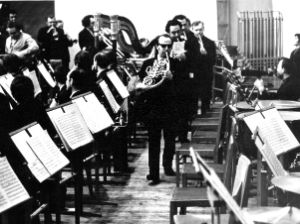Concert | Visiting Orchestras
Münchner Philharmoniker
Valery Gergiev, conductor
Visiting : Munich

World premiere of Alfred Schnittke’s First Symphonie in 1974 Photo: With kind permission of Natalia Pavlutskaya
Valery Gergiev continues his series of Bruckner-interpretations with the composer’s long underappreciated Sixth Symphony. Together with Münchner Philharmoniker, he will present the work in combination with Schnittke’s monumental and pluralistic First Symphony.
Bruckner was returning from a journey, his only truly long journey, when we wrote his Sixth Symphony. Maybe that is why it is so very different from the others: less monumental, more flowing, with only very few of the notorious reverberating pauses that we like to count among his style characteristics. Maybe that is why the work stood in the shadow of its neighbours for so long: the artful sound cathedral of the Fifth and the music of life and hope that is the Seventh, with a mourning ribbon in its slow movement. In recent years, however, there have been some changes in the reception of Bruckner. Almost as if the international elite of conductors had agreed to no longer neglect this jewel, the Symphony in A Major has suddenly been receiving more attention.
Valery Gergiev, who can build his interpretation on a long and special Bruckner-tradition in Munich, prefaces the Sixth with a similarly expansive work: Alfred Schnittke’s “First Symphony”, composed in the early 1970s. “A work”, as the composer says, “in which I experimented a great deal. For instance, there are hard, aggressive variations on ‘Dies irae’ with a massive tonal language. You cannot hear it clearly at first, but then it becomes clearer and clearer, turns into a grid for a twelve-tone row and suddenly I take two tones that are accidentally identical to a popular song and then there’s a little fragment of this pop song and the whole thing topples over into banality, which, in fact, is not so wrong at all, because ‘Dies irae’ and banality, there is a connection there. – Connections of motive are always very important … and a twelve-tone row is not enough. It must soon be time for a different kind of thinking about motive, a kind that is much more pluralistic.” It was.
Concert Programme
Alfred Schnittke (1934 – 1998)
Symphony No. 1 (1972 – 1974)
Anton Bruckner (1824 – 1896)
Symphony No. 6 in A major (1881)
Cast
Münchner Philharmoniker
Valery Gergiev – conductor
A Berliner Festspiele / Musikfest Berlin event